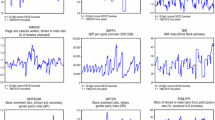Abstract
The positive contribution of women’s education to the economy and society has long been known in many countries, particularly in developing countries, to attract more attention. A large number of literatures on women’s education clearly suggest that educating a woman is equivalent to educating a family and that this woman is better educated than her counterparts, men, in many respects. The low level of education of women in Muslim countries, most of which are in developing countries. The increase in the level of education depends on the elimination of gender inequalities in education. Muslim countries must use all their resources to achieve their economic development goals. Women’s participation in the economy is a major economic resource that is not widely used in Muslim countries. The literature (Dollar and Garti in Gender inequality, income, and growth: are good times good for women? World Bank Working Paper, 21–2 1999; Barro in The Contribution of Human and Social Capital to Sustained Economic Growth and Well Being, Canada Government, Portage 2001; Schltz 2002; Klasen 2002; Knowles et al. in Oxf. Econ. Pap. 54 118–149 2002) suggests that gender equality has a positive effect on economic growth. Taking into account Muslim countries, it can reasonably be argued that the rate of the gender effect on economic growth is higher in developing countries. This paper analyzes the impact of gender inequality in education on economic growth for tunisia will be explored, using econometric techniques. The document will take into account all variables of primary school graduation, obtaining a high school diploma, obtaining a high school diploma and obtaining a University degree with economic growth will be examined in detail for the period 1970–2009. At this level Women’s contribution to the economy is threefold. The first is that the increase in the level of human capital, as a result, decrease the fertility rate of women. The second argument is that the infant mortality rate could decrease by decreasing the fertility rate of women. Third, raising the level of education of women can affect the level of education of the next generation positively. In this context, in order to understand the long-term relationships between these variables, i.e. gender inequality in education and economic growth, a co-integration approach will be applied. The empirical results show that there is a long-term relationship between these variables.
Similar content being viewed by others
References
Ali.: Role of Women in development. T.Hussain, Interviewer (2011)
Barro, R.J.: Education and economic growth. In: The Contribution of Human and Social Capital to Sustained Economic Growth and Well Being. Portage: Canada Government (2001)
Barro, R., Lee, J.-W.: Sources of economic Growth. Carnegie-Rochester Conf. Ser. Public Policy 40, 1–46 (1994)
Barro, R., Sala-i-Martin, X.: Economic Growth. McGraw-Hill, New York (1995)
Chen, D.H.C: Gender equality and economic develepment. The World Bank Policy Research Working Paper, 3285:31 (2004)
Dickey, D., Fuller, W.A.: Likelihood ratio statistics for autoregressive time series with a unit root. Econometrica 49, 1057–1072 (1981)
Dollar, D., Garti, R.: Gender inequality, income, and growth: are good times good for women? World Bank Working Paper, 21–2 (1999)
Eagle, R.F., Granger, C.W.J.: Cointegration and error correction representation: estimation and testing. Econometrica 55, 251–276 (1987)
Ghulam, M.: Gender inequality in education: impact on income, growth and development. MP Paper, 8 (2005)
Gregory, A.W., Hansen, B.E.: Residual-based tests for cointegration in models with regime shifts. J. Econom. 70(1), 99–126 (1996)
Hatemi-J, A.: Test for cointegration with two unknown regime shifts with an application to financial market integration. Empir. Econ. 35(3), 497–505 (2008)
Herz, B., Sperling, G.B.: What works in girls’ education: evidence and policies from the developing world. Council on Foreign Relations (2004)
Hill, A., King, E.: Women’s Education in Development Countries. Johns Hopkins University Press, Baltimore, MD (1995)
Klasen, S.: Does gender inequality reduce growth and development? evidence from cross-country regressions. Policy research report on gender and development working paper No. 7. World Bank, Washington, DC (1999)
Klasen, S.: Low schooling for girls, slower growth for all? cross-country evidence on the effect of gender inequality in education on economic development. World Bank Econ. Rev. 16(3), 345–373 (2002)
Klasen, S., Lamanna, F.: The impact of gender inequality in education and employment on economic growth: new evidence for a panel of countries. Fem. Econ. 15(3), 91–132 (2009)
Knowles, S., Lorgelly, P., Owen, P.D.: Are educationalgender gaps a brake on economic development? Some cross-country empirical evidence. Oxf. Econ. Pap. 54(1), 118–149 (2002)
Kruger, A.B., Lindahl, M.: Education for growth: why and for whom? Working Paper 429:44, Princeton University (2000)
Lewis, M., Marlaine, L.: Social exclusion and the gender gap in education. World Bank-Working Paper, No: 4562 (2008)
Lumsdaine, R.L., Papell, D.H.: Multiple trend breaks and the unit-root hypothesis. Rev. Econ. Stat. 79(2), 212–218 (1997)
Schltz, T.P.: Why goverment should invest more to educate girls. World Dev. 30(2), 212 (2002)
Sen, A.K.: Development as capability expansion. J. Dev. Plan. 19, 41–58 (1989)
World Bank: Engendering development—through gender equality in rights, resources, and voice. Oxford University Press, New York (2001)
Author information
Authors and Affiliations
Corresponding authors
Rights and permissions
About this article
Cite this article
Karoui, K., Feki, R. The impacts of gender inequality in education on economic growth in Tunisia: an empirical analysis. Qual Quant 52, 1265–1273 (2018). https://doi.org/10.1007/s11135-017-0518-3
Published:
Issue Date:
DOI: https://doi.org/10.1007/s11135-017-0518-3




